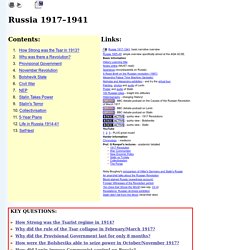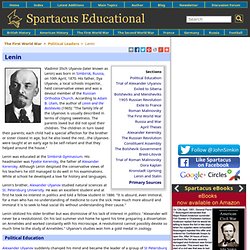

The Russian Revolution - Part 3. The Russian Revolution - Part 2. The Russian Revolution - Part 1. d6_lenin_and_the_bolsheviks.mp3 (audio/mpeg Object) d5_causes_of_the_russian_revolution_of_march_1917.mp3 (audio/mpeg Object) Russia 1917-1941. In this module you will learn: • FIVE strengths and SEVEN weaknesses of the Tsar’s Government in 1913 • FIVE causes of the March 1917 Revolution [Why Was There A Disaster?]

• Events on the SIX days of the March Revolution • SIX problems of the Provisional Government [Government That’s Provisional Will Be Killed] • Events of the Provisional Government, March – November 1917 • THREE days of Bolshevik Revolution, 6–8 November 1917 • SEVEN reasons the Bolsheviks won [Perhaps Seven Powers Gave Lenin An Opportunity] • SIX characteristics of the Bolsheviks state [Great Big Changes Create Terrible War] • THREE causes of the Civil War [Causes of the Civil War] • SIX reasons the Bolsheviks won [Why The Bolsheviks Won The War] • SEVEN events of the Civil War, 1918–1921. • The New Economic Policy[NEP] • How Stalin took power [Stalin Takes Power] • SIX reasons Stalin introduced Collectivisation [Six Factors Now To Collectivise Kolkhoz] • A timeline of Collectivisation.
Leon Trotsky. Lenin. Vladimir Illich Ulyanov (later known as Lenin) was born in Simbirsk, Russia, on 10th April, 1870.

His father, Ilya Ulyanov, a local schools inspector, held conservative views and was a devout member of the Russian Orthodox Church. According to Adam B. Ulam, the author of Lenin and the Bolsheviks (1965): "The family life of the Ulyanovs is usually described in terms of cloying sweetness. The parents loved but did not spoil their children. The children in turn loved their parents; each child had a special affection for the brother or sister closest in age, but he also loved the rest...the Ulyanovs were taught at an early age to be self-reliant and that they helped around the house. " Lenin was educated at the Simbirsk Gymnasium. Lenin's brother, Alexander Ulyanov studied natural sciences at St. Lenin idolized his older brother but was dismissive of his lack of interest in politics: "Alexander will never be a revolutionist.
Lenin returned to St. Russia 1900 to 1939. Ancient Rome Medieval England World War One World War Two Nazi Germany Cold War History Learning Site > Modern World History > Russia 1900 to 1939 Russia of Alexander III Alexander III Russification Karl Marx Political Views in Russia Revolutionary Ideology Socialist Revolutionaries Populism Julius Martov George Plekhanov The Russian Church Russia and Agriculture Nicholas and Alexandra The Bolsheviks The Mensheviks Gregory Rasputin The Russo Japanese War The 1905 Russian Revolution The October Manifesto Peter Stolypin The First Duma The Second Duma Russia and World War One Russian and War March 1917 The Provisional Government Alexander Kerensky November 1917 Vladimir Lenin.